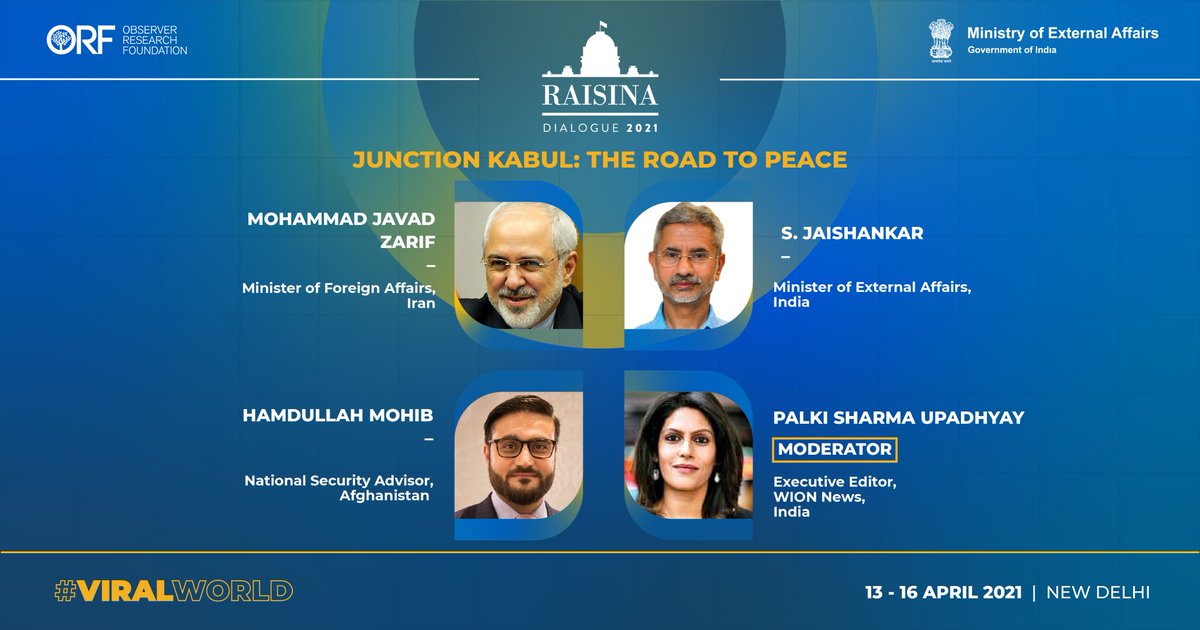
We are LIVE tweeting the discussion – “Insecure Jobs: Towards Social Safety for All” with @smritiirani @NKSingh_MP @amitabhk87 @WorldBank @JUNAIDWBG
Participate with #Raisina2021
Participate with #Raisina2021

.@JUNAIDWBG: With technological change always happening, workers are seeking to upgrade their skills and a safety net must also be vest in their ability to build up their human capital.
.@JUNAIDWBG: During Covid-19, India discovered lot of fault lines inside its own social safety net. It recognised that perhaps Urban India, migrants and the informal sector had not been fully covered in the safety net.
#Raisina2021
#Raisina2021
.@smritiirani: When the Prime Minister announced the Jan Dhan Yojana, the gender impact was such that women’s saving accounts went from around 28 percent to above 40 percent. #Raisina2021
.@smritiirani: The pandemic brought to light how the saving accounts became a very powerful instrument administratively where over 220 million women had access to Direct Cash Transfers from the government treasury worth 30,000 crore. #Raisina2021
.@smritiirani: There have been several government projects, which in terms of proclamation are not gender inclined however have had greater impact with respect to gender. #Raisina2021
.@smritiirani: The government is extremely sensitive to the gender needs of our society and ensures that an equal opportunity to get those benefits are given as much to women. #Raisina2021
.@smritiirani: One of the takeaways from the Ayushman Bharat Yojana is that in the past two years we have seen 24 million Indian women, especially in the rural belt, screened themselves for breast cancer and 16 million women screened themselves for cervical cancer. #Raisina2021
.@smritiirani: In the PPE suits manufacturing story, India did not have a single facility in March 2020, however, we had the Ministry of Defence turn around its DRDO labs so that most of the textile units could have sampling and testing done in those labs. #Raisina2021
.@WorldBank (Shrayana Bhattacharya): The response to the pandemic had a very important female face, not only in terms of the bank accounts but also livelihood groups and community kitchens – women’s groups played an important role in terms of delivery of benefits. #Raisina2021
.@WorldBank: Almost 90 percent of all households in India received at least one benefit during the pandemic – this was largely driven by the PDS, the state disaster response funds and direct benefit transfer accounts. #Raisina2021
.@WorldBank: One of the key lessons comparing India’s response to other countries is that while transfers were significant, in terms of cash, there needs to be more focussed scale up of the safety net system in urban areas. #Raisina2021
.@NKSingh_MP: The recent government initiative not only strengthened the social protection system but it has also helped women in multiple ways. #Raisina2021
.@NKSingh_MP: Initiatives in this regard are really scattered as there are multiple ministries and multiple organisations, we perhaps require a coherence of those efforts into one ministry or entity, which can put together a better symmetry between these initiatives.#Raisina2021
.@amitabhk87: There have been very rapid advancements in both the digital and telecommunication technologies — these have resulted in a tectonic shift in our labour market, both in informal as well as formal sectors. #Raisina2021
.@amitabhk87: The gig economy is important part of a transformation in this work landscape, they are forming the backbone of a very vibrant entrepreneurial ecosystem in India. #Raisina2021
.@amitabhk87: Despite the pandemic, the perception towards the gig economy is largely unchanged and will get accelerated with the lifting of lockdown. #Raisina2021
.@amitabh87: A key lesson that has emerged is that we need to create social protection nets and institutional capacities for the gig workers. #Raisina2021
.@NKSingh_MP: I suggest that the “one nation, one ration card”, which has been applauded by countries all over the world, can be replaced by “one nation, one security card” in India.
#Raisina2021
#Raisina2021
We come to the close of our discussion “Insecure Jobs: Towards Social Safety for All” with
@smritiirani ,@NKSingh_MP ,@amitabhk87 , @WorldBank and @JUNAIDWBG
Thank you for joining us!
#Raisina2021 #RaisinaDialogue
@smritiirani ,@NKSingh_MP ,@amitabhk87 , @WorldBank and @JUNAIDWBG
Thank you for joining us!
#Raisina2021 #RaisinaDialogue
• • •
Missing some Tweet in this thread? You can try to
force a refresh






